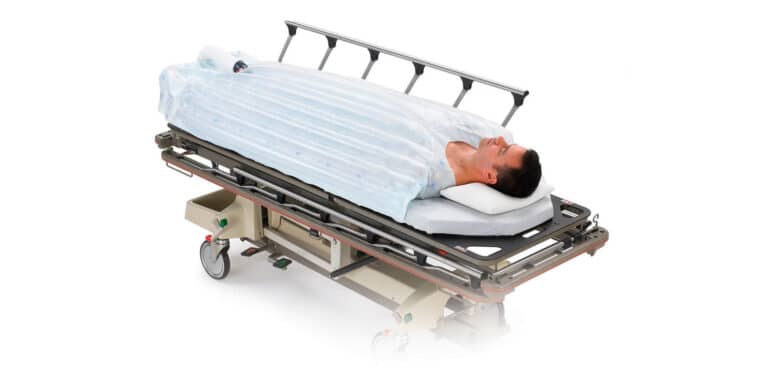Liva Nova
Heater-cooler devices are used in emergent settings during cardiothoracic and other invasive surgeries to warm or cool a patient in order to optimize medical care and improve a patient’s outcome. Heater-cooler devices include water tanks that provide temperature-controlled water to external heat exchangers or warming/cooling blankets through closed circuits. Although the water in the circuits does not come into direct contact with the patient, there is the potential for contaminated water to enter other parts of the device or transfer bacteria through the air through the device’s exhaust vent into the environment—and ultimately to the patient’s internal anatomy during invasive surgery. It is possible for these infectious contaminants to remain within the internal anatomy once the surgery is complete and the patient has been staged for recovery.
The U.S. Federal Food and Drug Administration (FDA) issued a Class 2 recall for Stockert 3T Heater-Cooling System on October 25, 1019. The recall was initiated after several cases of serious infections were reported by patients who had undergone open surgery with the assistance of Stockert 3T Heater-Coolers or similar devices. In short, federal investigations found a flaw in the disinfectant/water preservation used to disinfect the water tank in Stockert 3T Heater-Cooling devices, which allowed harmful bacteria to grow and transmit to patients on the table. Due to an unintended chemical reaction in the design of the recalled device, the growth of micro-organisms—such as NTM in the water tank of the heater-coolers—persisted.
Patients who have reportedly become ill from infections linked to the Stockert 3T Heater-Cooling System contracted a potentially life-threatening strain of bacteria called Nontuberculous Mycobacteria, or NTM. While NTM is a bacteria found naturally in the environment, it can cause a life-threatening infection if introduced to an open wound during an invasive surgical procedure.
Class II recalls include devices in which the probability of serious adverse health consequences is remote. The Class II recall for Stockert 3T Heater-Cooler devices is as follows:
- Recalled Product: SORIN Heater-Cooler System 3T 120V~/60Hz REF 16-02-85
- Description of product: The Stockert Heater-Cooler System is an independent 3-circuit-heating/cooling system. The three separate water circuits have been developed to serve as:
- Two circuits for the patient supplied by one tank (for the heating/cooling blanket and the heat-exchanger associated with the oxygenator), common temperatures ranging from 2 degrees Celsius to 41 degrees Celsius, tank volume 6 liters.
- One interchangeable heating/cooling circuit for cardioplegia heat-exchanger,
temperatures ranging from 2 degrees Celsius to 10 degrees Celsius (cooling tank) and/or from 15 degrees Celsius to 41 degrees Celsius (heating tank).
The FDA first issued a warning regarding the dangers associated with heater-cooler devices in 2015. The decision to warn the public came after 32 reports of infections were received between January 2010 and August 2015, with over 78 percent of the reports made in 2015. The Center for Disease Control and Prevention (CDC) also became involved during this time, identifying a need for patients and healthcare providers to be vigilant and proactively identify the signs and symptoms of a possible bacterial infection.
In May 2019, LivaNova PLC—previously known as the Sorin Group—offered to pay $225 million to settle claims in connection with its Stockert 3T Heater-Cooler device amid allegations that the device contributes to severe infections in surgical patients.
Health experts continue to urge patients to monitor their health for signs of NTM infections since there is a latency period before symptoms develop—sometimes as long as months or even years after invasive surgery. Common symptoms include:
- Fever
- Night sweats
- Fatigue
- Muscle aches
- Unexplained weight loss
- Loss of energy
- Joint pain
- Vomiting
- Persistent cough or cough with blood
- Redness or irritation surrounding the surgical site
- Difficulty breathing
- Lack of appetite
Patients who are are symptomatic should follow up with their health care provider to establish an official diagnosis. NTM can be diagnosed through:
- Medical and surgical history
- Physical examinations
- Culture studies
- CT scans
Unfortunately, it is not uncommon for patients to experience recurrent infections or to develop new strains of NTM. Though rare to contract, cases of NTM can be debilitating for patients who develop them and may pose a lifelong struggle to battle the symptoms and adverse consequences.
Slater Slater Schulman LLP is dedicated to the representation of individuals who have been injured by the use of a Stockert 3T Heater-Cooling System. If you or someone you love has been injured as a result of the use of a Stockert 3T Heater-Cooling System, please contact Slater Slater Schulman LLP for a free consultation by filling out the form on this page or by calling our office at (800) 251-6990.



